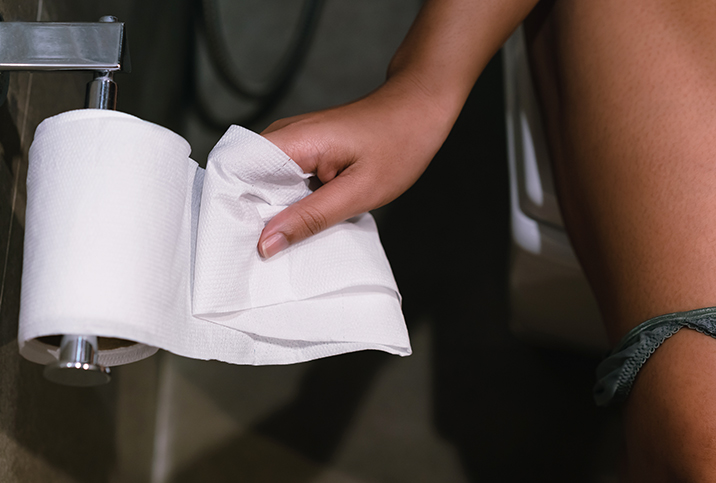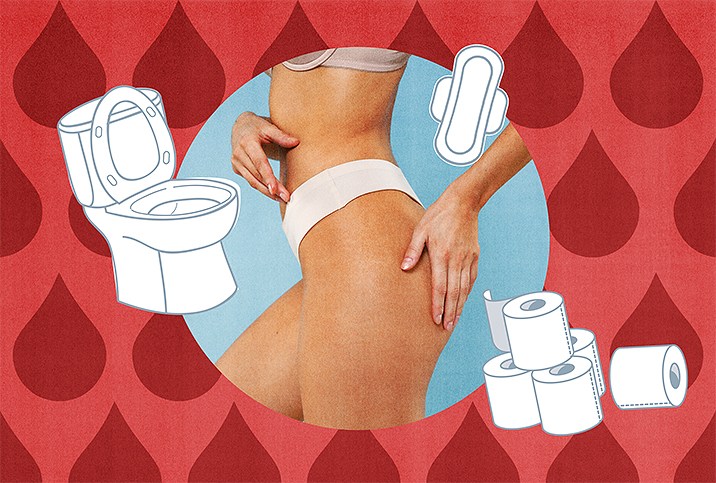No Sex, Please, I'm Constipated

It's one thing to be backed up running errands. But what do you do when chronic constipation interferes with sexual intimacy?
A lot of things can happen during sex. There are a lot of ins and outs, ups and downs—movement, all around. But what happens when a prime pleasure zone becomes a source of discomfort? No surprise: Feeling constipated during sex can really get in the way of intimacy.
"Patients with constipation can feel full, uncomfortable and bloated, and that can obviously have an impact on your body image and self-perception," said Kyle Staller, M.D., M.P.H., director of the Gastrointestinal Motility Laboratory at Massachusetts General Hospital and assistant professor of medicine at Harvard Medical School.
Chronic constipation is estimated to affect anywhere from 3 percent to 27 percent of the world's population, with prevalence increasing with age. At least 2.5 million Americans bring a constipation-related complaint to their doctor every year.
No matter how chronic constipation comes about, it's bound to affect your comfort, social bonds and quality of life. And when it comes to sex, constipation can lead to body shame, discomfort and outright pain.
What are the causes of chronic constipation?
Causes of constipation range from dietary to psychological.
"If lifestyle changes, exercises or other standard treatments don't work, chronic constipation may indicate muscular issues or even traumatic experiences impacting muscle function," Staller said. While it's rare that constipation causes serious harm to the body, it can have a huge impact on your quality of life.
"When it's impacting your quality of life, that's the time to see a specialist," Staller said. "But there may be people who meet criteria for constipation and aren't bothered by it, and we don't necessarily need to medicalize it."
Chronic constipation is medically defined as when bowel movements become less frequent and difficult. These episodes can resemble sitting for hours on the toilet, straining to push poop out.
One potential cause is food moving too slowly through the digestive tract, delaying the colon's water absorption, thus yielding hard, difficult-to-expel stool.
"There's a scale of constipation, and you think about it differently depending on where they fall [on that scale]," Staller said. "Some people have intermittent constipation, but in general, those aren't the people showing up in our office."
When constipation becomes a constant concern for patients, they might consult a medical professional, who can then use the Rome IV Criteria to diagnose chronic constipation. To be diagnosed, a patient must experience two or more of the following in a six-month period:
- Straining during more than 25 percent of defecations.
- Passing lumpy or hard stools (Bristol Stool Form Scale 1-2) more than 25 percent of defecations.

- Sensing incomplete evacuation in more than 25 percent of defecations.
- Sensing blockage in the rectum and/or anus in more than 25 percent of defecations.
- Doing manual maneuvers to facilitate more than 25 percent of defecations (e.g., digital evacuation, support of the pelvic floor).
- Passing fewer than three bowel movements per week.
- Rarely experiencing loose stools without the use of laxatives.
- Insufficient criteria for irritable bowel syndrome.
Measuring your experience against these criteria can prove helpful, Staller explained, since everyone seems to have their own understanding of constipation.
"Constipation is one of those funny things that has a big pop-culture definition," he said. "In the GI clinic, we spend a lot of time explaining to people what's true."
Some of the explanation revolves around the Rome IV Criteria, which points out, for example, that it's possible to poop regularly and still be constipated. For instance, if someone is straining and feeling "incomplete evacuation" most of the time, that's checkmarks against two of the qualifications needed for a diagnosis of chronic constipation.
Certain things put people more at risk for the condition, including:
- Not eating enough fiber or drinking enough water.
- Not getting enough exercise.
- Eating large amounts of milk or cheese.
- Living a stressful life.
- Having a uterus, especially during or following pregnancy. Hormonal changes may disrupt digestion and the fetus in a growing womb physically squishes the intestines, making it harder for stool to pass.
- Resisting the urge to pass a bowel movement or changing routines.
- Taking certain medications and drugs, like antipsychotics, antidepressants and opioids.
- Conditions like irritable bowel syndrome (IBS), diabetes, Parkinson's disease and lazy bowel syndrome.
Staller noted that usually there's no need to assume your constipation is indicative of any underlying medical conditions. Even if constipation happens or you see yourself in the Rome IV Criteria occasionally, if it's not getting in the way of your life regularly or if changing eating or exercise habits helps, you don't need to seek medical care.
"The people who do need help generally aren't the people that necessarily need to do a lot, other than increasing fiber in their diet, getting more exercise and making sure they're well hydrated," Staller said.
Constipation and sex
When Staller sees patients who are dealing with chronic constipation, conversations sometimes unfold about how bowel pain is impacting their sex lives.
"When they're constipated, they're feeling uncomfortable," he said. "They have an altered body image because they're bloated and sex is the last thing on their mind."
Just as body-image problems due to disordered eating can disrupt enjoying sex, so can constipation.
But there's also another big factor: pain. Often, Staller finds, people who may have problems with chronic constipation also have dyspareunia, or painful vaginal intercourse during sex. In addition, constipation has been found to affect women or anyone with a vagina more frequently than people without one.
"Constipation is not exclusive to any gender identity, but having a vagina puts you more at risk," Staller said. "It's a very easy biological explanation in the sense of just where the organs and muscles are. The vagina and rectum occupy a very similar space, and are in this intricate web of muscles and nerves that make up the pelvic floor."
Chronic constipation can then lead to a vicious cycle where it's hard to relax because of constipation and that inability to relax makes it harder to poop.
If someone with a vagina comes into Staller's clinic with chronic constipation, more often than not, they're also enduring discomfort or pain during penetrative sex, possibly caused by tight muscles in the pelvic floor.
"It's like you're trying to push stool through a closed door," Staller said. "Those same contracted muscles can actually prevent a penis from entering the vagina comfortably, as well."
In order to use the bathroom and allow for comfortable penetration in either a vagina or anus, the muscles around them need to relax. Chronic constipation can then lead to a vicious cycle where it's hard to relax because of constipation and that inability to relax makes it harder to poop.
Clinical work and research have shown chronic constipation and pain during intercourse can be influenced by trauma, which can include sexual assault and/or sexual abuse.
"Psychological trauma can play out in the body where the pelvic floor is tight, almost as if to defend itself from being violated," Staller said.
Constipation help
When it comes to intermittent constipation, everyone seems to follow their own tips for relief. Helpful constipation remedies may include drinking coffee in the morning, eating more fibrous food or going for a run.
But constipation isn't always cured by one-off tricks. Sometimes it's chronic, a symptom of a medical condition or trauma interrupting the processes that facilitate both pooping and sex.
Again, Staller noted, if constipation is getting in the way of your quality of life, consult medical care. Millions of people struggle with constipation every year and there are ways to address it, including through laxative use, which Staller said has an unnecessarily bad reputation.
"There's this false belief that laxatives are an evil thing and are bad for you," he said. "But in reality, many people, especially if they're dealing with other medical conditions, will need laxatives to live a comfortable life.
Constipation is not exclusive to any gender identity, but having a vagina puts you more at risk.
"If lifestyle changes and/or laxative use don't help or are impossible, before we even go to some of the fancy prescriptions for constipation, we should evaluate the pelvic floor because it's commonly missed," Staller continued.
Tests can measure the pressure in your pelvic floor, helping medical professionals evaluate whether you're a good candidate for treatments like pelvic floor therapy or biofeedback. These therapies, Staller explained, help patients work to relax certain muscles as they contract others.
When helping patients through these treatments, Staller said, he likes to tell them to imagine a scene: Someone who they don't like is in the room, and they want to push them out the door. In this situation, two things have to happen: You have to give them a good push and the door has to open.
"Fundamentally, that's what happens in pelvic floor physical therapy," Staller said. "They teach you how to give a good push and they also teach you how to open the door."


















